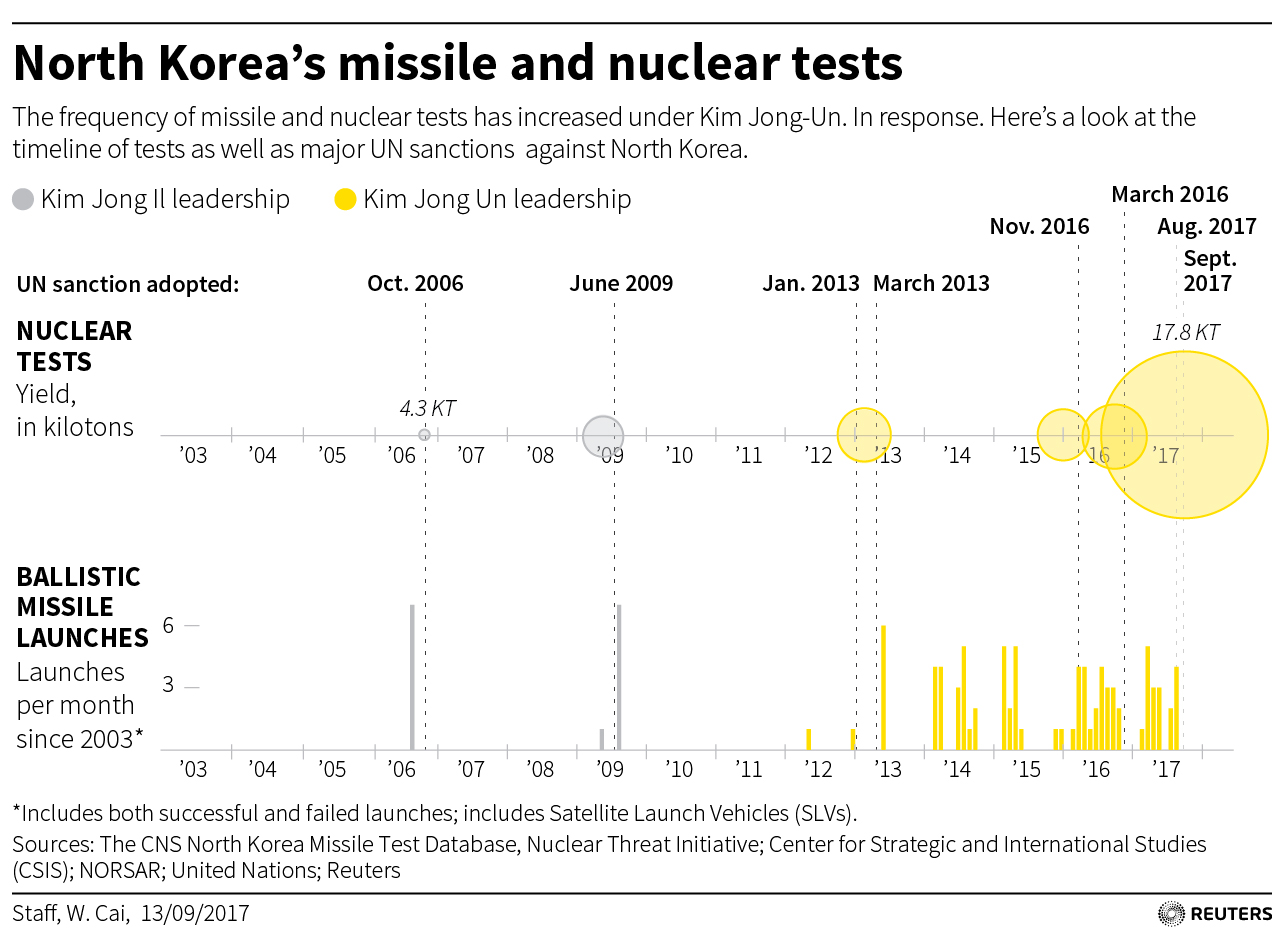
By Michelle Nichols and Jack Kim
UNITED NATIONS/SEOUL (Reuters) – The U.N. Security Council unanimously voted to step up sanctions on North Korea, with its profitable textile exports now banned and fuel supplies capped, prompting a traditionally defiant threat of retaliation against the United States.
Monday’s decision, triggered by the North’s sixth and largest nuclear test this month, was the ninth such resolution unanimously adopted by the 15-member Security Council since 2006 over North Korea’s ballistic missile and nuclear programs.
Japan and South Korea said after the passage of the U.S.-drafted Security Council resolution they were prepared to apply more pressure if North Korea refused to end its aggressive development of nuclear weapons and ballistic missiles.
A tougher initial U.S. draft was weakened to win the support of China, Pyongyang’s main ally and trading partner, and Russia, both of which hold veto power in the council.
“We don’t take pleasure in further strengthening sanctions today. We are not looking for war,” U.S. Ambassador to the United Nations Nikki Haley told the council after the vote. “The North Korean regime has not yet passed the point of no return.
“If it agrees to stop its nuclear program, it can reclaim its future … If North Korea continues its dangerous path, we will continue with further pressure,” said Haley, who credited a “strong relationship” between U.S. President Donald Trump and Chinese President Xi Jinping for the successful resolution negotiations.
North Korea’s ambassador, Han Tae Song, told the U.N.-sponsored Conference on Disarmament in Geneva on Tuesday the United States was “fired up for political, economic, and military confrontation”.
The North regularly threatens to destroy the South and its main ally, the United States, which it accuses of continual preparation for invasion.
“My delegation condemns in the strongest terms, and categorically rejects, the latest illegal and unlawful U.N. Security Council resolution,” he said.
The Democratic People’s Republic of Korea (DPRK) was “ready to use a form of ultimate means”, Han said, without elaborating.
“The forthcoming measures by DPRK will make the U.S. suffer the greatest pain it ever experienced in its history.”
U.S. disarmament ambassador Robert Wood took the floor to say the Security Council resolution “frankly sent a very clear and unambiguous message to the regime that the international community is tired, is no longer willing to put up with provocative behavior from this regime”.
U.N. member states are now required to halt imports of textiles from North Korea, its second largest export after coal and other minerals in 2016 that totaled $752 million and accounted for a quarter of its income from trade, according to South Korean data. Nearly 80 percent went to China.
“This resolution also puts an end to the regime making money from the 93,000 North Korean citizens it sends overseas to work and heavily taxes,” Haley said.
“This ban will eventually starve the regime of an additional $500 million or more in annual revenues,” she said.
RESUME DIALOGUE
South Korea’s presidential Blue House said the only way for Pyongyang to end diplomatic isolation and free itself of economic pressure was to end its nuclear program and resume dialogue.
“North Korea needs to realize that a reckless challenge against international peace will only bring about even stronger international sanctions against it,” the Blue House said.
However, China’s official Xinhua news agency said in a commentary that the Trump administration was making a mistake by rejecting diplomatic engagement with the North.
“The U.S. needs to switch from isolation to communication in order to end an ‘endless loop’ on the Korean peninsula, where “nuclear and missile tests trigger tougher sanctions and tougher sanctions invite further tests,” Xinhua said.
Japanese Prime Minister Shinzo Abe quickly welcomed the resolution and said after the vote it was important to change North Korea’s policy by stepping up pressure.
The resolution imposes a ban on condensates and natural gas liquids, a cap of 2 million barrels a year on refined petroleum products, and a cap on crude oil exports to North Korea at current levels. China supplies most of North Korea’s crude.
A U.S. official, familiar with the council negotiations and speaking on condition of anonymity, said North Korea imported about 4.5 million barrels of refined petroleum products annually and 4 million barrels of crude oil.
Chinese officials have privately expressed fears that an oil embargo could risk causing massive instability in their neighbor. Russia and China have also expressed concern about the humanitarian impact of stiffer sanctions on North Korea.
Haley said the resolution aimed to hit “North Korea’s ability to fuel and fund its weapons program”. Trump has vowed not to allow North Korea to develop a nuclear missile capable of hitting the mainland United States.
South Korean officials said after the North’s sixth nuclear test that Pyongyang could soon launch another intercontinental ballistic missile in defiance of international pressure. North Korea said its Sept. 3 test was of an advanced hydrogen bomb and was its most powerful by far.
The latest resolution contained new political language urging “further work to reduce tensions, so as to advance the prospects for a comprehensive settlement”.
The resolution also calls on countries to inspect vessels on the high seas, with the consent of the flag state, if they have reasonable grounds to believe the ships are carrying prohibited cargo.
It also bans joint ventures with North Korean entities, except for non-profit public utility infrastructure projects.
(Additional reporting by Hyonhee Shin and Christine Kim in Seoul, Philip Wen in Beijing, Kaori Kaneko in Tokyo, David Brunnstrom in Washington and Stephanie Nebehay in Geneva; Editing by Nick Macfie)










